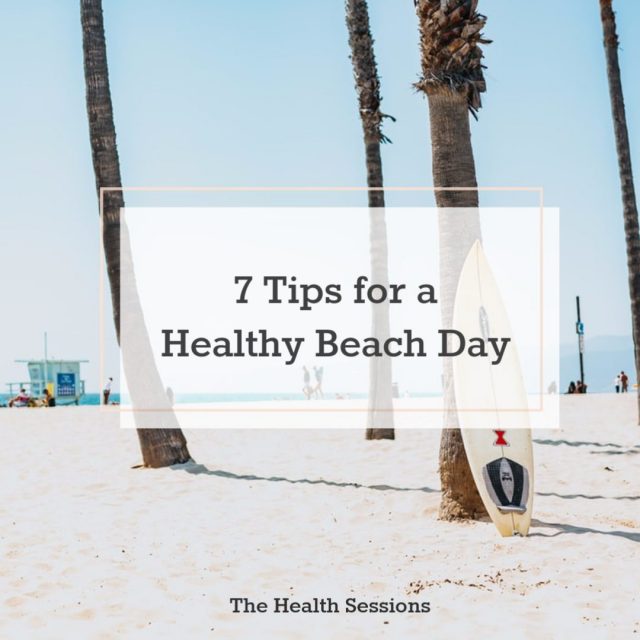Go Natural: 4 Health Benefits of Organic Health Care and Beauty Products

As a kid, I spent countless of summer days building sand castles, floating in the sea and being fully immersed in books on the beach. I can still remember the delight of eating salty and crispy French fries in the sand after swimming and playing all day.
Nowadays, I don’t tolerate the heat very well, but still, going to the beach feels like the ultimate summer experience. And there’s some truth in getting your ‘vitamin Sea’. Soaking in salt water works wonders for your skin, fights infections and is therapeutic for your joints and bones. The beach also offers great opportunities to relax and work out in a fun and doable way. And of course, getting your daily dose of fresh air and vitamin D boosts your health too.
But we all know the typical tourist look of people who got a massive sunburn after a day at the beach. Heat stroke is also a real risk when you spend all day under the burning sun. Plus, lying down on your towel all day, only flipping from front to back to get an even tan or grab some unhealthy snacks, is a relaxing, but not really recharging pastime.
Make the most of your vacation time with these 7 tips to have a healthy beach day!

This blog post contains some affiliate links to resources I thought you might find helpful, at no extra cost to you. All opinions are my own.
Holiday brochures may picture tanned people sipping mojitos on their sun bed, but unfortunately, sun and alcohol are a risky cocktail. They both cause dehydration and increase your chances of getting a heatstroke. And of course, drinking near bodies of water could lead to life-threatening accidents.
So swap your alcoholic drinks for refreshing lemonades and festive mocktails. You can also bring flavored water in an fruit infuser water bottle or stay hydrated with homemade iced teas. Coconut water is another great way to replenish the electrolytes you lose when you sweat.
Getting a sunburn seriously hurts your health. How can you enjoy the summer sun and protect your skin?

When you spend hours in the burning sun or work out in high temperatures, your body might get overheated. Warning signs of a heat stroke – when your core body temperature reaches 40 C (104 F) or higher – are flushed skin, a throbbing headache, feeling confused or dizzy, shallow breathing an a racing heart. If you notice these symptoms, seek immediate medical help. Untreated heatstroke can lead to serious complications and even death.
Luckily, you can prevent getting a heat stroke during a beach day. First of all, to maintain a normal body temperature, it’s important to prevent sunburn and stay hydrated. Just don’t drink (too much) caffeine and alcohol, because they have a mildly diuretic effect. You should also avoid strenuous activities during the hottest times of day, especially if you aren’t acclimated to the heat. Instead, find ways to cool down, whether it’s splashing in the sea or retreating to the shade. Be extra cautious for symptoms of overheating when you have a health condition or take medications.
The beach provides tons of opportunities to move your body and have fun at the same time. Just a simple walk on the beach already makes a better workout than strolling along the promenade. And what about going for a swim, flying a kite or building sandcastles with the kids? You can mix things up with a game of soccer, volleyball or beach tennis. Play frisbee, try standup paddling or find a quiet spot to do yoga.
All that fun in the sun will make you hungry. So which portable snacks should you pack in your cooler for a healthy beach day?
Fresh fruit and raw vegetables are packed with flavour, sun-protection antioxidants and fluids that help keep you hydrated. Bring slices of watermelon, a fruit salad or a mix of carrots, cucumber sticks and celery with a healthy dip. A handful of trail mix or healthy chips will replace the salts lost with sweating.
For a more hearty bite, savory muffins, wraps and stuffed pita breads make a beach-friendly choice. Of course a simple sandwich works too, if you chose toppings that don’t get soggy or fall out. If you prefer a low-carb lunch, you could pack a salad in a jar or fill a Bento box with cold cuts and crudité.

Is there anything more relaxing than getting lost in stories? Whether you love to read feel-good fiction, transformative travel stories or ‘sick lit’, a book will take you on an armchair journey even if you’re lying on the beach. If you’re more into audio, you could soak up the key insights from bestselling books with Instaread. You can also go analogue for the day and bring smart games or play classic card games with your friends.
But don’t completely forget where you are. Make time to take in the beauty of the beach – the sun on your face, the saltiness in the air, the breeze on your skin, the sand touching your feet and the relaxing sounds of the waves. There’s no better place to practice the art of mindfulness and savour every sensation.
A healthy beach day can easily turn into a natural wellness treatment. Sand, for example, is perfect for exfoliation. Gently rubbing loose sand over your legs removes dead skin cells from your limbs, which gives you a glowing skin.
Swimming in salt water opens up your pores, clearing impurities. Seawater also contains minerals like iodine and magnesium that improve your skin, even when you suffer from eczema or psoriasis. It’s like free thalassotherapy! What’s more, you can give yourself a quick mud mask to get rid off excess oils in your skin.
What’s your best tip for a healthy beach day?
If you enjoyed reading this article, you might also like: